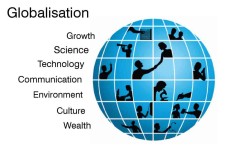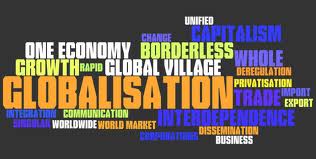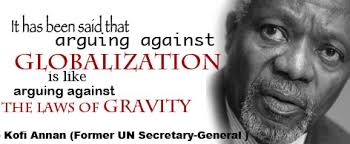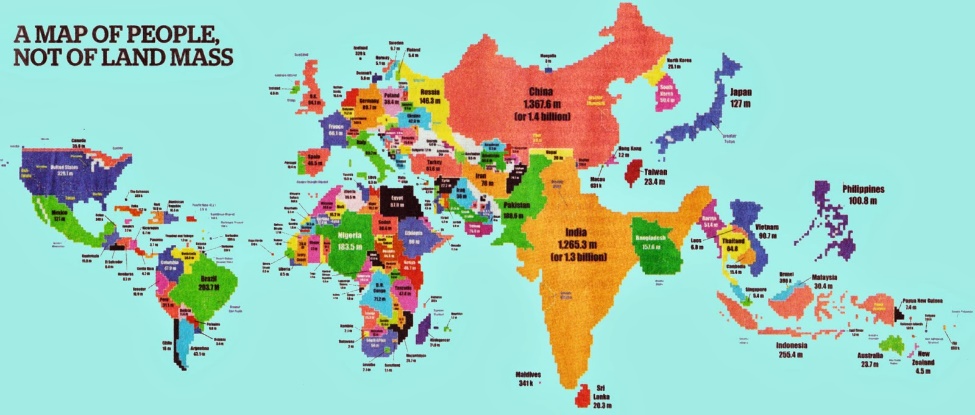14. Living as a World Christian (ii)
Looking Outwards - "For God so loved the world...."
"The Lord announced the word, and great was the company of those who proclaimed it." (Psalm 68:11)
"Go into all the world" (Matthew 28:18-20; see also Acts 1:8)
"Then the disciples went out and preached everywhere, and the Lord worked with them and confirmed his word by the signs that accompanied it." (Mark 16:20)
"Those who had been scattered preached the word wherever they went." (Acts 8:4)
"This Gospel of the kingdom will be preached in the whole world as a testimony to all nations, and then the end will come." (Matthew 24:14)
In this lesson we:
- consider the impacts of globalisation on world thinking & challenges of world evangelism
- briefly consider the meaning and limits of contextualisation
- seek to incarnate the Gospel outside of our church walls and live as world Christians
Challenges of Globalisation
Christians today live in a rapidly globalising world. This is the new operating environment for the church, and it is our world. We are the people of God called to reach it with the Gospel.


And it is changing rapidly. Every minute, 639,800GB of global IP data are transferred, 204 million e-mails are sent, online denizens view 20 million photos on Flickr, Twitter processes 100,000 new tweets and 320 new Twitter accounts are created. An Internet minute is filled with 30 hours of videos uploaded and 1.3 million video views; there are 6 million Facebook views and 277,000 logins. We have become global. And the data are growing exponentially.
(Source: http://www.cnet.com/au/news/intel-reveals-what-happens-in-a-single-internet-minute/)
What exactly is globalisation? Experts disagree, but on a simple level globalisation involves the international movement and integration of people, ideas, cultural practices and supply chains.
The world in the 21st century is much "smaller" that it was a hundred years ago, even fifty years ago. People, things and thoughts are criss-crossing the globe at an accelerating rate.
Take air travel, for example. In October 2014 "the International Air Transport Association (IATA) released its first 20-year passenger growth forecast, projecting that passenger numbers are expected to reach 7.3 billion by 2034. That represents a 4.1% average annual growth in demand for air connectivity that will result in more than a doubling of the 3.3 billion passengers expected to travel this year".
(see New IATA Passenger Forecast Reveals Fast-Growing Markets of the Future).
That's a lot of passengers, a lot of people on the move (even counting multiple trips by individual travellers), growing every single year.


The overall global population is increasing rapidly, living standards are (generally) going up, people are living longer (on average) and are better educated. We are all connected. No one can afford another major international conflict. Demands are increasingly for more goods and services, better, faster, cheaper, are escalating. International borders are weaker. A financial crisis in one market can impact the global economy. A few are concerned about the impact of all of this on the environment.
Pluralism is a reality, not just an esoteric concept. Are we keeping pace?
Globalisation is all around us. Check out the origins (and diversity) of the food and beverages you consume (coming as it does from all over the world, with a short shelf life), the clothes you wear, the consumer products you purchase, who services your phone and credit cards. Get the news of the day from every country, on thousands of websites, updated around the clock.
Globalisation worked well for the first 1st century church. Pax Romana (Rome ruled), a large network of trade routes, roads, peace, good communications, increasingly common tastes and common languages (Latin and Greek) broke down parochial barriers. Christianity was the first religion that was truly global, with universal appeal. Greek and Roman gods and myths were adopted from one another's cultures in various places, but did not span many cultures, often did not replace household gods, or clan gods.
Christianity has a global mandate. The Great Commission is a key element of our world view. "Let the earth hear His voice". Our mission and our call are to reach out to a world that is relying on false hope and present the liberating truth of salvation through Christ.
Islam also has a global vision (Dal al Islam The Place of Islam/Submission vs Dar al Harb The Place of War), which contributes to major flash points, such as the November 2015 Islamic State attacks in Paris, but aims at reaching the entire world. Islam is lacking in global leadership, and beset by internal divisions, but has massive resources and hundreds of millions of adherents.
Communism (in its various national forms) sought to be global. Millions died as a result of this failed world view and hundreds of millions of others remain under its authority.
Secular humanism seeks to be global, but remains mainly Western; seeks inroads through universities, etc., later in the course we will look at the issue of world view clashes.
Globalisation means high speed communications, cheap travel, international understanding, social media that cross all boundaries (can lead to propagation of error).
What does the global church look like? Pros, cross-cultural options; threats lessened; all benefit from free movement. Cons: uncertain beliefs, mixed up world views; implicit (uncritical) acceptance of "everything".
Linked to globalisation are risks of syncretism (mixing and matching elements of different faith systems, to find the "fit" that suits different cultures).


Our calling/challenge is to reach the world and disciple the nations for Christ.
Contextualisation
Contextualisation means putting language (and our message) into context, so that listeners understand. There are pros and cons. Are we approaching the same "God"? Do we understand the Bible in the original meaning and reinterpret it to fit our world? Is this hermeneutically sound?
The role of Christian leadership is to translate the message into Life. Meanings of words can be adjusted to respondent cultures (cultural anthropology), possibilities, cf Eternity in Their Hearts (Don Richardson, Bethany House, 2006). This should not result in a range of culturally-driven theologies that lose the truth of the Gospel.
There is considerable debate over changes to Bibles in Muslim societies, ie altering the text to reflect the language of those societies. What is lost when this is done?
Alternatively, contextualisation can take the plain meaning out of the message and turn Christianity into a philosophy, generalisations, or ethics, like Aesop's Fables.
It is important not to confuse world views with personal preferences, styles and cultures, eg
- to drink wine or to abstain
- styles, roles and affiliations of church government
- celibacy as a choice
- clothing, jewellery and other adornments
- what to eat or refrain from eating
- worship styles
- kinship obligations
- cultural authority structures
Christians occasionally take stands against technological changes and emerging tools. There was a period when preachers spoke out against television; these days some are chary of embracing new social media; but these are only tools, or devices; it is important not to confuse the tools with those who use them, and how they are employed.

Some things are not negotiable, eg polygamy, but don't confuse personal preferences and ideas of Christian standards with revelation, eg Romans 14, Colossians 2:16-23. Generational differences, modernity, technological change impact the way we live and inculcate the Gospel.
The Christian world view must be redemptive. Too many lives are broken/isolated by legalism.
The Gospel does not make other people just like us. Every person is unique, eg Levi (Matthew) and Simon the Zealot. The role of the Holy Spirit is to transform. While we are different, He turns us into the Family of God
Incarnating the Gospel Outside the Church
Jesus was God in the flesh; that is why the idea of a Cristian world view is so revolutionary.
"But when the set time had fully come, God sent his Son, born of a woman, born under the law, to redeem those under the law, that we might receive adoption to sonship." (Galatians 4:4, 5)
"That which was from the beginning, which we have heard, which we have seen with our eyes, which we have looked at and our hands have touched - this we proclaim concerning the Word of life. The life appeared; we have seen it and testify to it, and we proclaim to you the eternal life, which was with the Father and has appeared to us." (1 John 1:1, 2)
"In the past God spoke to our ancestors through the prophets at many times and in various ways, but in these last days he has spoken to us by his Son." (Hebrews 1:1, 2; See also Philippians 2:6-8, Hebrews 2:14-18; Colossians 2:9)
And He speaks to the modern world through us ....

What is your image of Jesus Christ? He was neither Western nor Eastern; he was comfortable ministering to all cultures. Jesus showed us how to find common ground to share the Gospel, drawing people to Him and not alienating true seekers. Jesus' operating world was very small, but the Holy Spirit is present everywhere in the world.
A Christian world view involves developing a Christ-like prayer life - living and praying like Jesus.
If we seek to live by Jesus' view of the world we must see, understand and relate to the following people, through Christ's eyes, and with His compassion:
- adherents of other religious systems
- those who are poor, homeless, unemployed or destitute (for whatever reason)
- widows and orphans
- indigenous Australians
- immigrants and refugees (regardless of how they arrive)
- those with criminal records (regardless of the severity of their past actions)
- sick people
- those with disabilities
- men and women with views about moral issues that do not coincide with ours
The Bible is clear that if the world we relate to does not include such "neighbours" our vision and message are faulty. Pray that God would touch your heart and fill it with love for them, then show you that they are perishing and in need of Him.
Christians also need to put themselves in the shoes of others when sharing the Gospel; the message and imagery can be unintelligible when presented without adequate explanation to people with little or no prior understanding of Christian teaching.
- "They'd been elated to leave. 'Always we had to say "Thank you, Jesus", to a picture of a white man' ". (Boo, K, Behind the Beautiful Forevers, Random House, New York, 2012, p. 207; depiction of Hindu girls relating their experiences in a Christian mission in Mumbai.)
- "Here is the Hindu temple... here is the Sikh temple ... and here is the Christian temple" (commentary from a taxi driver to the writer during a drive through Old Delhi).
- "Are you justified?" "Are you sanctified?" -(titles of Christian tracts used in a Christian open air meeting in Brisbane, observed by the writer; the language of the title and text was alien to most of the recipients).
Living as world Christians
We must have a clear-headed view of the role of church in society?
In a globalised context, the Gospel is not a series of dialogues, ideas, doctrines, theologies, principles, traditions, covenants, dispensations, councils, denominations, revelations, synods, creeds, or assemblies. The centre of the Gospel is a person: Jesus Christ. "This is my Son; hear Him". Don't build tabernacles in memory of your traditions.
- Engage with the world. Be "salt" and "light" in education, business, government, media, arts and entertainment, the market and the marketplace. Be sophisticated, talk the talk of modernity, but don't be hijacked (Colossians 2:8), don't lose the simplicity of the eternal truth of the Gospel, don't be fooled by human reasoning that conflicts with the message - after all, you have the Mind of Christ. Be purposeful in seeking to understand what is going on in life, but wise enough to know what you can impact. Seek a good understanding of the great issues, be aware, alert, in touch, and equipped to provide answers for those in need (some areas are specialised, eg life sciences).
- Engage with the world Christian community. Support national Christian leadership. Where church and state are officially separated, work within that framework.
- Don't be straight-jacketed by culture disguised as Christian legalism.
- But don't use your "freedom" in such a way as to cause others to stumble (Romans 14:13-23)
- Support mission - in both directions. Get involved in Christian missions "here" and "there". "Don't go across the sea until you are prepared to go across the street". Seek out the multicultural world around you. Proclaim the message - where proclamation is illegal, ask God to reveal the best ways to publish the message and disciple new believers.
- Live in the world; exposed to all of it, but don't become like the world (John 16-18). Don't mimic the world. We are the Body of Christ, called and set apart to represent Him, model His life and care, in the world.
- Seek to live the love and care of the Gospel in practical ways.
 How does Jesus see the world?
How does Jesus see the world?
"I Believe in Reaching My World"
The heart of God is reaching the world. Acts 1:8 promises the Holy Spirit's power to enable us to do so. As a boy in Sunday School, I learned and often repeated John 3:16: "For God so loved the world that He gave His only Son, so that whoever believes in Him would not perish, but have eternal life." Here we see the motive, the means, and the message of world evangelism. In Romans 1:16 Paul declares, "I am not ashamed of the Gospel of Christ because it is the power of God for salvation for everyone who believes". This is the heart of revival: every great revival in history led to great outreach. Christ died for the sins of the world; He rose again, to live in us, and He sent His Spirit to give us power to be His witnesses, with an eye to eternity. We believe in reaching our world.
But what is our world?
I recently saw a sign across the internal wall of Flinders Street railway station in Melbourne that said, "Go back to where you came from". A popular television series of the same name featured asylum seekers arriving on Australia's Christmas Island by boat, to be met in suburbia by responses of "Go back to where to you came from. You are not welcome here. You are not part of our community". Don't fall into that trap. Jesus said that we should "Lift up our eyes" and see a harvest of souls around us, in our world (John 4:35); we need to recognise our world. Unless you are an alien you live in your world. Not in some faraway place in your imagination, some Utopia "out there", but here and now.
When I was a boy The Seekers were a national musical sensation. Across Australia people were playing and singing their songs. One was called "A World of Our Own". It went like this: "Close the doors, light the lights. We're stayin' home tonight. Far away from the bustle and the bright city lights. Let them all fade away. Just leave us alone. And we'll live in a world of our own. We'll build a world of our own. That no one else can share. All our sorrows we'll leave far behind us there. And I know you will find, there'll be peace of mind, when we live in a world of our own".
As Christians we have a totally different world view, a different message. We are not escapists, running away; we live in the world; God lives in our world; we are called to reach that world. Each of us lives in a specific world, our world, whether it is our family, street, office, school, community group or factory, where there are people we can reach more effectively than anyone else can; there are men, women and children only you can reach.
Far from escaping the world, when you go out past your front door you are in your world, where Jesus says, "I will go with you". You may be the only Christ-follower there, for them.
Those who reached our world
I am grateful to God for those who reached into my world. Take a glance at church history and you will see that they did so amid persecution, against the odds, at great cost; they pushed boundaries, sacrificed, lived and died to reach the world. We would not be Christians today if someone had not reached into our world.
Let me tell you about Keith Cannon. Born in 1895, Keith grew up a Methodist; he joined the Queensland Government Railway as a clerk after he left school; later on he saw service as a medic on the Western Front in France during WWI.
In 1925 Keith was filled with the Holy Spirit and began to preach in his spare time. (There is no such thing as Christian "laity".) He became a pioneer in the early Pentecostal movement in Queensland. He preached on Sundays, led regular "tarrying meetings" on Sunday afternoons, where people would pray and wait for the baptism of the Holy Spirit. Keith regularly preached out in the street on the corner of George and Tank Streets in the city of Brisbane, as well as leading a mid-week Bible Class. He helped collect and send funds to support missionaries overseas. All the while he was working and raising a family. Close family members went off to Africa and New Guinea as missionaries. Keith died in 1962.
What a life! Keith was intent on reaching his world. There are people in Australia and overseas who are Christians and Christian leaders today because of Keith's determination to reach his world. At work in his cubicle in the railways office people called him Mr Cannon. As he preached the Gospel and discipled new believers, people called him Pastor. As a boy I called him Grandad. Keith Cannon died when I was only 7, but He reached his world; that's largely why I am a Christian today. I am so grateful.
Whatever your story, someone reached into your world, someone was instrumental in bringing you the Good News about salvation in Jesus Christ.
But we are not content living in the past. Our message is for today. Christianity is not the only missionary religion, but it is the only message that gives hope, absolute assurance, and a personal relationship with God. There is no other. Only Christ. He is not exclusive, or tribal. In fact, Jesus was criticised for reaching out by those who wanted to monopolise God; He said that there were "other sheep" He wanted to bring into God's "pasture" (John 10:16). The early church had to push out past boundaries that existed in their heads and traditions, past their comfort zones, to see a world on the other side of the fence, the appealing people, the unattractive ones, the "other" side. But He died for all. God is not willing that any should perish (2 Peter 3:9); that's why we have a sense of urgency. Don't be content to live in your comfort zone; people who like comfort zones quickly become boring; so take the challenge of stepping out of your comfort zone and reaching your world.
How can we reach our world?
Where do we start? There are lots of places. But don't go across the ocean if you can't go across the room. Allow yourself to get close to people.. to talk to them.. have a meal with them.. listen to them.. speak to them in love. You may feel inadequate; we all feel inadequate, but that's one reason God gave the Holy Spirit. The words that you speak are not only your words, but God in you, who can use you to get past the barriers that people put up. Jesus said that no one can come to Him unless God the Father draws them (John 6:44). People may tell you that they cannot see what you are getting at; that's because they are spiritually blind (2 Corinthians 4:4). But Christ opens the eyes of the blind; He transforms lives.
As Christians, we believe in world mission. We have unparalleled means to reach our world, and doors to do so; billions live in unreached people groups. We have to be involved. Christian communities everywhere support charities and practical ministry; there are lots of genuine needs; but the greatest need is spiritual; people are spiritually hungry, they need Christ.
Get involved in a short-term missions trip, and see what God can do through you. Not as an obligation, not as spiritual "homework", a project, or a precondition to God's tick of favour, but because you are motivated by the love of Christ.
What we have to share is not a message, or a list of dots points of what we believe, or an intellectual argument, but a person, Jesus Christ. As we sit back and watch thousands of people, like ants, going to and from work and shops and school and life, remember that Jesus did the same; He said that we are like salt and light in our world. It is easy, like the Seekers, to go home and shut the door on the outside world (we all need some alone time; even Jesus needed alone time), but as the People of God our calling is not to be insular and quarantined, but to be Jesus in our world.
Someone once said that, "Christ has no body now on earth but yours, no hands but yours, no feet but yours, Yours are the eyes through which to look out Christ's compassion to the world. Yours are the feet with which he is to go about doing good; Yours are the hands with which he is to bless men now." Do you know who wrote that? A Spanish nun who lived in Avila, Spain; her name was Teresa, and she died in 1582. She also said, "Be content knowing you are a child of God. Use the gifts you have received, and pass on the love that has been given to you". This how we can reach our world.
Conclusion
Do you live in the world? The Stock Exchange, your local supermarket, coffee shop or post office. In education, men's sheds, or childcare. Our world is not the time we spend in church but the other 166 hours in every week. Nearly all of Jesus' ministry was in the community, not at church. His love motivates us to use our skills and weaknesses and busy lives to reach our world. It is true that we are strangers and pilgrims (Hebrews 11:13, 1 Peter 2:11), looking for an eternal city, but as long as we eat and breathe and wake up every morning sucking oxygen, this is our world.
Imagine the Father, Son and Holy Spirit have a conversation: "Let's reach the world". That's why Jesus came (John 8:16, 18, 29, 42). In every age God has had people positioned to do the same; for our generation we are those people. I love my church life, but the front door on the way out has an invisible sign that says, "You are now entering your mission field". It only takes one generation to go from loving God to godless.
Make a decision, a life commitment. Don't lock yourself away. If you cannot feel motived, get on your hands and knees and ask God to fill you afresh with His love for the world and lift up your eyes to see world around you that needs to know and experience what you have in Christ. He will give you the power and capacity. Not because of guilt, pressure, or a burden, nor because you are erudite or convincing, or a great evangelist, or occupy a pulpit, or have a Christian job description, but because of Jesus in you, connected to you, giving you life and relationship, His supply line. Be infectious with God's unconditional love. Otherwise your world may never see and hear it in words they can understand.
Ps Allan Davis
August 2015








 How does Jesus see the world?
How does Jesus see the world?